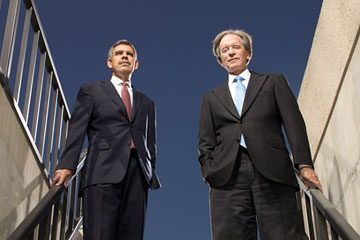
PIMCO's Mohamed El-Erian and Bill Gross.
(3 of 6)
He likes to drink from this mug at the up to three-hour investment-committee meetings that he and El-Erian hold almost daily with key employees to discuss what's happening in the markets. Back in 2005 the discussion was about how the investment world had fallen in love with the idea of a Goldilocks economy--the notion that markets were in a long period of growth and stability, neither too hot nor too cold, thanks to the wisdom of the world's central bankers and the seemingly endless growth of emerging markets.
Gross, El-Erian and the PIMCO crew had another term for it: stable disequilibrium. Markets seemed calm, but the underlying fundamentals were anything but sound. Not only were financial institutions overleveraged, but both income inequality and the household-debt-to-GDP ratio were growing faster than they had since the era leading up to the Great Depression. Living and working in Southern California rather than in the financial fortresses of Wall Street and the City of London provided Gross with a unique view of just how unstable the housing market in particular was becoming. Newport Beach is a little more than an hour's drive from San Bernardino and Stockton, which were among the hardest-hit areas in the housing crisis. Eager to understand what was happening on the ground, he pulled a junior credit analyst off his desk and told him to go to seven cities and pretend to be a home buyer. The results proved what we all now know: you barely had to have a pulse to get a mortgage.
In late 2005, PIMCO started warning its investors to get out of mortgage-backed securities and housing-linked derivatives. Later the company made a fortune by getting back into the housing game after values plummeted, buying up government-backed loans. (PIMCO also bet correctly on a government bailout of GMAC, GM's financing arm.)
Market Shapers
Gross isn't all-seeing, and his trading record includes some whoppers, like the failure to ride the wave on long-dated Treasuries in 2011. But despite the occasional miss, Gross and El-Erian have solidified their already important role as major financial insiders. Treasury has the two on speed dial. El-Erian, a macroeconomist whose name comes up in discussions about who will be the next World Bank head or Treasury Secretary (he says he hasn't been approached to replace Timothy Geithner at Treasury and is very happy at PIMCO), flies around the world giving advice to leaders such as German Chancellor Angela Merkel and European Central Bank president Mario Draghi.
